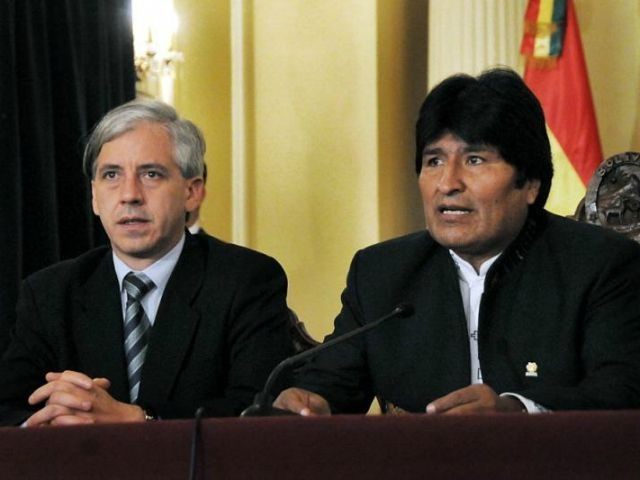Brazilian magazine Veja is confirming and adding to a story that surfaced last week implicating Bolivia’s President Evo Morales, Vice President Álvaro García Linera, and a number of close confidantes in the running of an elaborate cocaine trafficking operation from the highest levels of government.
In an article titled “Narcos”–after the popular Netflix series–Veja confirmed a report first appearing in the Spanish newswire EFE this week, suggesting that a former DEA informant has evidence that proves Morales, Vice President Álvaro García Linera, his late father Raúl García, and their pilot were all implicated in selling cocaine internationally. Also implicated are Morales’ pilot, Walter Álvarez Agramonte, and other senior advisers.
Veja adds to the list of suspects a number of high-ranking members of law enforcement.
While the article, in Portuguese, has yet to surface outside of the print edition of the magazine, Bolivian outlet Eju has translated the article into Spanish and scanned it for online perusal. The article names a Colombian informant, Carlos Toro, as the source for the information. Toro is currently suing the United States for $5 million, which he claims he deserves as pay for his cooperation with the DEA. To prove his case, Toro must reveal the information he gave the DEA, which he says includes proof that Morales and his cohort are running a cocaine smuggling operation. Toro worked with the DEA for 29 years.
Toro also worked on the case against Carlos Lehder, a co-founder of the Medellín Cartel in Colombia. Lehder plays a prominent role in the Netflix series, Veja notes, tying their article back to the title.
Veja adds another level of intrigue to the story, noting that such accusations have been flying since 2012. Back then, the whistleblower was Bolivian Colonel Germán Cardona, who fled to Spain after accusing high-ranking government officials of running a cocaine trafficking operation. Three months after his declarations appeared in print, the mother of the journalist who published his remarks was found strangled to death. Evidence indicated the 80-year-old woman was raped before being killed. A day later, Cardona returned to Bolivia and denied that any of the claims he had made were true.
Following the EFE report, the Bolivian government accused the newswire of being involved in a “smear” campaign against Morales. The government has yet to respond to Veja, which also implicates the Venezuelan government in aiding the traffic of cocaine. Venezuela’s second-in-command, National Assembly President Diosdado Cabello, has long been accused of being the head of the Cartel de los Soles, a cocaine syndicate.
Veja has previously published similar accusations against Morales, but never with this level of detail. In 2012, the Brazilian magazine ran a piece accusing Morales of “incentivizing coca leaf harvesting” so that the nation produces a surplus. That surplus, in turn, is used for making cocaine, the magazine alleged. Morales increased the amount of land used for harvesting coca by 22% between 2006 and 2010.
The Bolivian government sued Veja for publishing the piece.

COMMENTS
Please let us know if you're having issues with commenting.